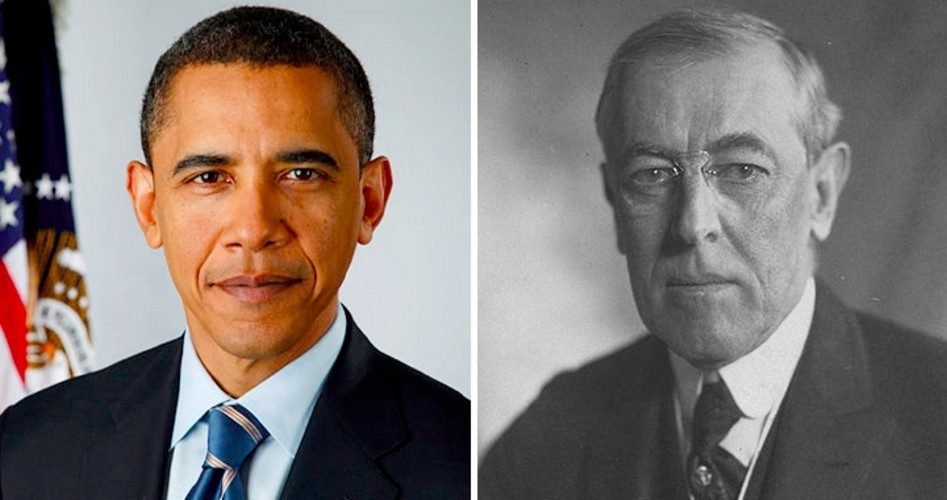
In a recent opinion article published by Gannet-owned Pacific Daily News, statements on foreign policy by President Barack Obama were unfavorably compared to his predecessor in the White House and archetypical “progressive,” Woodrow Wilson. The authors write:
Even Obama’s rhetoric has been disconcerting. Though he has not gone as far as Bush in announcing a crusade to wipe out “evil” in the world, he has echoed Woodrow Wilson’s post-World War I description of “America as the savior of the world.”
“Unlike the old empires, we don’t make these sacrifices for territory or for resources. We do it because it’s right,” Obama told troops returning from Iraq.
Wilson made the proclamation quoted in the piece in the days following the signing of the Treaty of Versailles that brought an end to World War I.
Obama and Wilson share more than just a penchant for spending American blood and treasure on foreign follies, however. There are a few interesting points of comparison.
Both men, for example, graduated from Ivy League schools. Wilson was a Princeton man while President Obama reports having graduated from Columbia and Harvard Law School.
Before he became a “community organizer,” President Obama was an adjunct law professor. Woodrow Wilson was a professor, as well, before becoming a college president.
There is also a remarkable similarity between the two men’s rapid rise to national political prominence.
A fact that still baffles observers is that Barack Obama served a scant four years in Washington before becoming the national harbinger of hope and change. Prior to his partial term in the U.S. Senate, Obama spent seven years in the Illinois State Senate, during which time he ran a failed campaign for Congress in 2000.
Wilson burst onto the scene quickly, as well. Before being elected governor of New Jersey in 1910, he never held elective office on any level. Somehow, the lack of experience didn’t keep him from winning the White House a mere two years later.
In addition to their belief in war as an effective tool for shaping the world according to their own progressive political views, Obama and Wilson perpetrated their progressive policies on domestic affairs, as well.
While Obama’s mission to extend the federal bureaucratic empire into every home in America is carried out by a devoted committee of White House czars, when it came to ruling in matters of domestic policy, Wilson looked to one man: Colonel Edward Mandell House.
Incidentally, during World War I, Wilson appointed Bernard Baruch to run the War Industries Board. Baruch was sometimes called the “industry czar.”
Colonel House was very much the model of the modern corps of White House czars that have been granted expansive powers by the current occupant of the Oval Office.
The international power brokers of the time (namely, the Council on Foreign Relations founded by House himself) were so impressed by Colonel House’s successful efforts at manipulating Wilson, that they established the National Security Council to make his role official. Since 1947, every American president has been subject to the direction and demands of NSC officials.
Back to Obama. Philip Dru: Administrator: Story of Tomorrow is a novel published in 1912, written pseudonymously by Colonel House the previous year. The protagonist, Dru, has so much in common with President Obama, it seems at times that the president reads House’s novel like a playbook for his administration.
In House’s book, Philip Dru hatches a plot to wrest control of the government from those he believes are ruining the Republic. Dru’s ultimate goal is to install himself as “administrator” of the nation (a sort of benevolent dictator). With this title comes the unchecked power to enact his agenda, a roster of programs that includes an income tax, a social security plan, a central banking system, and a global governing body designed to preserve international security through the apparatus of a collective world congress.
Specifically, Dru’s aim was to create a government in the United States that reflected the “socialism as dreamed of by Karl Marx” married with a “spiritual element” that would serve as a delicate velvet glove around the iron fist of absolutism.
While Barack Obama undeniably espouses a substantial number of Administrator Dru’s precepts, there are several other parallels between Dru’s platform and that of the Obama administration.
First, consider the case of the aforementioned czars so prevalent in the Obama administration. Are these czars not the very essence of the “administrator” as defined by Dru in House’s book? Do they not oversee vast amounts of territory under the jurisdiction of the federal government? According to most estimates (and given their rapid proliferation, an estimate isn’t easy to make), President Obama has named over 36 czars, at least 31 of whom are actively carrying out his commands. That is quite the notorious accomplishment given that that exceeds the total number of czars who ruled Imperial Russia during its entire history.
Next, consider this statement from page 222 of Philip Dru: Administrator: “Our Constitution and our laws served us well for the first 100 years of our existence, but under the conditions of today, they are not only obsolete, but even grotesque.”
Dru was speaking of his frustration that the limited government established by the Constitution was hampering his efforts to redistribute wealth according to his Marxist vision of equality.
With that in mind, read what Barack Obama, then a state lawmaker, told a Chicago radio station during an interview conducted in 2001:
But, the Supreme Court never ventured into the issues of redistribution of wealth, and of more basic issues such as political and economic justice in society…. The Constitution is a charter of negative liberties. Says what the states can’t do to you. Says what the federal government can’t do to you, but doesn’t say what the federal government or state government must do on your behalf.
Then, bemoaning the failure of the civil rights movement to ignore the courts and effect a more grass-roots approach to changing society, Obama laments that the Constitution (“as interpreted”) prevents the creation of an “actual coalition of powers through which you bring about redistributive change” and the United States, he declares, “still suffers” from the restraints placed on that power by the Constitution.
An essential step on Philip Dru’s path to converting America into a socialist utopia was placing a government representative on the board of all businesses in the country so as to dismantled the capitalist chokehold on corporations. Colonel House (through the character of Dru) declared that the United States was “debased by the power of wealth, under the thin guise of the constitutional protection of property.”
In order to facilitate the rapid implementation of every plank of his platform, Dru ignored Congress, decrying it as a hindrance to codifying his version of “good laws.”
President Barack Obama outdoes Dru, declaring on the White House website, “We Can’t Wait” and at every opportunity showing off his “king complex” by issuing reams of executive orders in the absence of congressional action.
Finally, so that all Americans might be equal, Administrator Dru enacts regulations placing “the property and lives of all” within his benevolent bailiwick. Then, in order to assure that this mission is accomplished quickly, Dru proclaims himself the ultimate source of all applicable laws. (See pages 154, 221).
Every unbiased observer would be forced to admit that since the hour of his first inauguration, President Barack Obama has done everything in his power (and beyond it) to insinuate the federal government into every facet of life and to diminish and destroy the core constitutional principles of private property, civil liberties, and personal freedom.
In many ways, it seems, in building the ultimate bureaucracy, Barack Obama is following the blueprint drawn over a century ago by by Woodrow Wilson’s chief architect of progressivism, Edward Mandell House.
Joe A. Wolverton, II, J.D. is a correspondent for The New American and travels frequently nationwide speaking on topics of nullification, the NDAA, and the surveillance state. He can be reached at [email protected].



